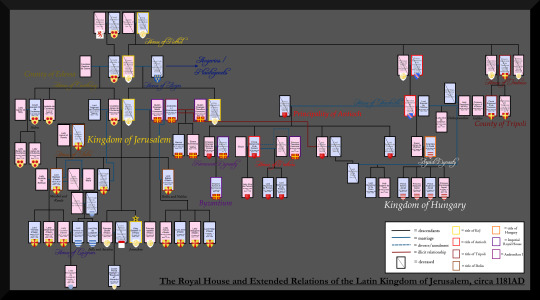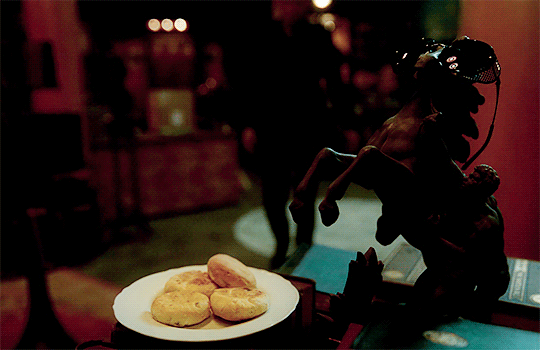#latin kingdom of jerusalem
Explore tagged Tumblr posts
Text

The final result of the genealogy project I mentioned previously.
*faints*
For personal research purposes, I've compiled the immediate relations of the royal family of the Latin Kingdom of Jerusalem at about the year 1181AD. I'm posting it here in case anyone else finds it useful for their own research.
Do take note of a few things, however:
I wasn't able to put absolutely everyone on it - the tree is difficult enough to read as it is, so I only included those I considered relevant to the local politics; for example, the vast majority of the Komnenos Dynasty is left out, but those listed are all related in some form or fashion.
Likewise, most relations extending to Western Europe are also excluded (IE: Aimery and Guy's other siblings).
I've provided a key to help read it as well as color-coded annotations where appropriate regarding state relations/major houses. Do note that the persons labeled as "deceased" are deceased by 1181. Several dates are unknown, however - no death date was provided for Countess Beatrice de Saone, so I didn't mark her as deceased, even though it is probable that she is by that date.
Be sure to follow the marriage lines closely. There are several cases of second and even third marriages. The marriage ties are especially intriguing in regards to the controversial Ibelins...
Andronikos I is highlighted differently because... he's Andronikos. Seriously, read up on him sometime if you haven't yet. He's... something.
Finally, I've also included the dynastic coats of arms when available (mostly from wikipedia). Some of these arms are different between the European and Levantine family branches, as well as different from attributed arms given in later centuries. An example of this is the arms of de Lusignan, which appeared as shown on the chart until Richard the Lionheart granted a red rampant lion charge on top of it later on. The arms of the Jerusalem cadet branch of the House of Anjou (d'Anjou-Jerusalem) are debated at this point, so I've just given the ruling family the later-known arms of the kingdom. Makes it easier to follow the path of the crown.
Obviously, you'll need to view it in a new tab/window to get all the details. Some of the words/names also bleed over into other lines here and there, but that's just the way the tree generator smashed them together.
#kingdom of heaven#kingdom of heaven 2005#kingdom of heaven fandom#baldwin iv#king baldwin iv#kingdom of jerusalem#latin kingdom of jerusalem#koh fandom#crusades history#crusades#historical#medieval#12th century
77 notes
·
View notes
Text
#medieval#history#jerusalem#history of jerusalem#urban history#medieval cities#crusader states#Latin Kingdom of Jerusalem#the crusades
7 notes
·
View notes
Text
So here's one of the coolest things that has happened to me as a Tolkien nut and an amateur medievalist. It's also impacted my view of the way Tolkien writes women. Here's Carl Stephenson in MEDIEVAL FEUDALISM, explaining the roots of the ceremony of knighthood: "In the second century after Christ the Roman historian Tacitus wrote an essay which he called Germania, and which has remained justly famous. He declares that the Germans, though divided into numerous tribes, constitute a single people characterised by common traits and a common mode of life. The typical German is a warrior. [...] Except when armed, they perform no business, either private or public. But it is not their custom that any one should assume arms without the formal approval of the tribe. Before the assembly the youth receives a shield and spear from his father, some other relative, or one of the chief men, and this gift corresponds to the toga virilis among the Romans--making him a citizen rather than a member of a household" (pp 2-3). Got it?
Remember how Tolkien was a medievalist who based his Rohirrim on Anglo-Saxon England, which came from those Germanic tribes Tacitus was talking about? Stephenson argues that the customs described by Tacitus continued into the early middle ages eventually giving rise to the medieval feudal system. One of these customs was the gift of arms, which transformed into the ceremony of knighthood: "Tacitus, it will be remembered, describes the ancient German custom by which a youth was presented with a shield and a spear to mark his attainment of man's estate. What seems to the be same ceremony reappears under the Carolingians. In 791, we are told, Charlemagne caused Prince Louis to be girded with a sword in celebration of his adolescence; and forty-seven years later Louis in turn decorated his fifteen-year-old son Charles "with the arms of manhood, i.e., a sword." Here, obviously, we may see the origin of the later adoubement, which long remained a formal investiture with arms, or with some one of them as a symbol. Thus the Bayeux Tapestry represents the knighting of Earl Harold by William of Normandy under the legend: Hic Willelmus dedit Haroldo arma (Here William gave arms to Harold). [...] Scores of other examples are to be found in the French chronicles and chansons de geste, which, despite much variation of detail, agree on the essentials. And whatever the derivation of the words, the English expression "dubbing to knighthood" must have been closely related to the French adoubement" (pp 47-48.)
In its simplest form, according to Stephenson, the ceremony of knighthood included "at most the presentation of a sword, a few words of admonition, and the accolade." OK. So what does this have to do with Tolkien and his women? AHAHAHAHA I AM SO GLAD YOU ASKED. First of all, let's agree that Tolkien, a medievalist, undoubtedly was aware of all the above. Second, turn with me in your copy of The Lord of the Rings to chapter 6 of The Two Towers, "The King of the Golden Hall", when Theoden and his councillors agree that Eowyn should lead the people while the men are away at war. (This, of course, was something that medieval noblewomen regularly did: one small example is an 1178 letter from a Hospitaller knight serving in the Latin kingdom of Jerusalem which records that before marching out to the battle of Montgisard, "We put the defence of the Tower of David and the whole city in the hands of our women".) But in The Lord of the Rings, there's a little ceremony.
"'Let her be as lord to the Eorlingas, while we are gone.' 'It shall be so,' said Theoden. 'Let the heralds announce to the folk that the Lady Eowyn will lead them!' Then the king sat upon a seat before his doors and Eowyn knelt before him and received from him a sword and a fair corselet."
I YELLED when I realised what I was reading right there. You see, the king doesn't just have the heralds announce that Eowyn is in charge. He gives her weapons.
Theoden makes Eowyn a knight of the Riddermark.
Not only that, but I think this is a huge deal for several reasons. That is, Tolkien knew what he was doing here.
From my reading in medieval history, I'm aware of women choosing to fight and bear arms, as well as becoming military leaders while the men are away at some war or as prisoners. What I haven't seen is women actually receiving knighthood. Anyone could fight as a knight if they could afford the (very pricy) horse and armour, and anyone could lead a nation as long as they were accepted by the leaders. But you just don't see women getting knighted like this.
Tolkien therefore chose to write a medieval-coded society, Rohan, where women arguably had greater equality with men than they did in actual medieval societies.
I think that should tell us something about who Tolkien was as a person and how he viewed women - perhaps he didn't write them with equal parity to men (there are undeniably more prominent male characters in The Lord of the Rings and The Hobbit, at least, than female) but compared to the medieval societies that were his life's work, and arguably even compared to the society he lived in, he was remarkably egalitarian.
I think it should also tell us something about the craft of writing fantasy.
No, you don't have to include gut wrenching misogyny and violence against women in order to write "realistic" medieval-inspired fantasy.
Tolkien's fantasy worlds are DEEPLY informed by medieval history to an extent most laypeople will never fully appreciate. The attitudes, the language, the ABSOLUTELY FLAWLESS use of medieval military tactics...heck, even just the way that people travel long distances on foot...all of it is brilliantly medieval.
The fact that Theoden bestows arms on Eowyn is just one tiny detail that is deeply rooted in medieval history. Even though he's giving those arms to a woman in a fantasy land full of elves and hobbits and wizards, it's still a wonderfully historically accurate detail.
Of course, I've ranted before about how misogyny and sexism wasn't actually as bad in medieval times as a lot of people today think. But from the way SOME fantasy authors talk, you'd think that historical accuracy will disappear in a puff of smoke if every woman in the dragon-infested fantasy land isn't being traumatised on the regular.
Tolkien did better. Be like Tolkien.
#tolkien#middle earth#jrr tolkien#lord of the rings#lotr#the lord of the rings#eowyn#writing fantasy#fantasy#female characters#writing#historical fiction#medieval women#medieval history#medieval#history#womens history
9K notes
·
View notes
Text

Christ and St Mary Magdalen at the Tomb
Artist: Rembrandt van Rijn (Dutch, 1606-1669)
Date: 1638
Medium: Oil on Panel
Collection: Royal Collection Trust, United Kingdom
Description
Christ and St Mary Magdalene at the Tomb reveals how imaginatively Rembrandt could interpret traditional religious subject-matter. The scriptural source for this scene is the Gospel of St John (20:11-18), who describes in some detail the burial and subsequent resurrection of Christ following the Crucifixion. Mary Magdalene returns to the tomb early the next morning, only to find the stone at the entrance removed and two angels inside it where the body should have been. She then fetches two of the disciples, who check that the tomb is empty and then leave her. The angels then ask Mary Magdalene, ‘Woman, why weepest thou?’ and she replies, ‘Because they have taken away my Lord, and I know not where they have laid him.’ At that moment she turns round and sees a man dressed as a gardener, not appreciating that he is the resurrected Christ. She appeals to him for information, but he calls her by her name and she instantly recognises him. (‘Jesus saith unto her, Mary. She turned herself, and saith unto him, Rabboni; which is to say master.’) Rembrandt has depicted the moment of realisation just before the actual recognition. Most artists chose to paint the next moment in the text, when Mary Magdalene reaches out towards Jesus and he forestalls her with the words ‘Touch me not’ (in Latin, Noli me tangere).
Rembrandt skilfully evokes the dawn as the opalescent light picks out from the darkness the towers of the Temple of Jerusalem, the upper half of the figure of Christ, the face of Mary Magdalene, and the outline of one of the angels in the tomb. This use of light is almost symbolic in both the physical and the spiritual senses. The paint is in general thinly applied and, apart from the treatment of the light and the vegetation around the tomb referring to Christ’s activities as a gardener, could almost be described as monochrome. It is only after a time that the eye focuses on the two female figures (the Gospels of St Mark and St Luke refer to three Maries at the tomb) in the middle distance on the left descending the hill.
Of particular note is the positioning of Christ, who in the relationship established between his partially silhouetted vertical form and the Temple of Jerusalem behind and the rocky cave next to him dominates the composition, whereas the twisting pose of Mary Magdalene is the pivot. The tension created between Christ’s standing figure and the twisting kneeling Mary Magdalene is palpable. The artist’s only other treatment of the subject of Christ and Mary Magdalene is in Brunswick (Herzog Anton Ulrich Museum): it is dated 1651 and is totally different in composition.
#oil on panel#rembrant van rijn#christ#mary magdalene#angels#tomb#christianity#holy bible#gospel of john#bible scene#biblical#dutch painter#landscape#temple#jerusalem#architecture#foliage#17th century painting#european art
59 notes
·
View notes
Text
Origin of the names of the 7 kingdoms of Hell
Ever wonder where do the names of the kingdoms (or regions) of Hell come from? Let's find out in this trivia post :3
WARNING, this post contains religious theme. If you feel comfortable, please ignore this.
Gehenna
"Gehenna", in the Bible and in real life, was originally the name of the valley of Hinnom, outside of the city of Jerusalem. In this valley, many committed the gruesome sin of sacrificing children to the god Moloch. Because of this sin, the valley was cursed by the Jews and its name was used to call the final punishing place of the reprobate. In Christianity, "Gehenna" is used to designate the place where all the demons and the damned human will thrown in at the Last Judgement, "the lake of fire", "the unquenchable fire".
Tartaros
"Tartaros", or Tartarus, was originally the term to describe the abyss of torment and suffering for the wicked and the Titans in Greek mythology.
In the 4th century BC, Greek culture and language were spread to all Eastern Mediterranean countries by the conquest of Alexander the Great. Greek became the common language in these countries and remained so for many centuries. The New Testament of the Bible was written in Greek. The term "Tartaros" was adopted by Christianity to describe Hell. Although "Tartaros" doesn't technically appear in the Bible, the associated verb tartaroō ("throw to Tartaros") does. (The verb itself is a shortened form of another verb with similar meaning kata-tartaroō ("throw down to Tartaros").
In the Bible, Tartaros is the place where fallen angels are chained to wait for judgement.
Hades
The name of the underworld in Greek mythology. It was also adopted by Christianity and used to describe Hell. However, different from Gehenna and Tartaros, Hades is a little bit complicated.
Before the work of redemption was completed in Jesus's death and resurrection, the gate of Heaven was closed. So when a someone died, that person would go to Hell (Hades) ragardless of good or bad. However, in Hades, there was "a great chasm", according to the Bible, separating the good and the bad. The good people either didn't suffer or was purified of their venial sins, while the bad people on the other side really did suffer. No one from "the good side" could cross to the other side, and vice versa.
After Jesus died, his soul descended to Hades and released the just who were detained in Hades and brought them to Heaven, while leaving the damned on the other side of the chasm, waiting for the Last Judgement, after which, both Hades and the wicked in it will be thrown into Gehenna "the lake of fire", for eternal punishment.
Abyssos
The name "Abyssos" comes from "abyss", which is also a word to describe Hell. The precise word "Abyssos" does not exist in the Bible or mythology, as far as I know.
Paradise Lost
This country shares its name with the famous work written by the poet John Milton in the 17th century. The poem Paradise Lost is a dramatized version that retells the story of the fallen angels and their role in the fall of Adam and Eve.
Niflheim
The name comes from Norse mythology of the Scandinavian people. Originally, Niflheim was realm of primordial ice and fog, being one of the two primordial realms, the other being Muspelheim, the realm of fire. Later, the realm became the abode of Hel, the daughter of the god Loki, and it became the afterlife for those who didn't die a heroic or notable death, overlapping with another realm in Norse cosmology, Helheim.
Abaddon
In the Bible, "Abaddon" is both a place and an entity. As a place, Abaddon is the place of destruction, the realm for the dead. As an individual entity, Abaddon is described in the Bible as "a king, the angel of the bottomless pit; whose name in Hebrew is Abaddon, and in Greek Apollyon; in Latin Exterminans" - Revelation 9:11
Now "Abaddon" is entirely tied with the meaning of destruction. Abaddon itself means destruction or "place of destruction". The root of the word abad means perish, or destroy. Both the Greek name Apollyon and the Latin name Exterminans mean destroyer.
#what in “hell” is bad?#prettybusy what in “hell” is bad?#whb trivia#whb gehenna#whb tartaros#whb hades#whb avisos#whb abyssos#whb paradise lost#whb niflheim#whb abaddon
126 notes
·
View notes
Photo

Jews in Palestine from the 7th century to the 19th century.
From “Atlas of Jewish History”, Martin Gilbert, Routledge, 1969, 2010
via cartesdhistoire
In 636, at the Battle of Yarmouk, the Arabs captured Tiberias and Galilee. Then they besieged and took Jerusalem and Caesarea before completing their conquest in 641 with the capture of Ascalon.
From the 8th century, the largest Jewish community was found in Ramleh, then, at the time of the Latin kingdom of Jerusalem (1099-1291), the most important Jewish communities were those on the coast: Tyre, Acre and Ascalon.
Between 1260 and 1516, relations between the Jews and the Mamluk power, fanatical and intolerant, were bad. The most important communities are in the interior (the ports were evacuated in the 13th century for fear of invasions): Jerusalem especially, Safed, Gaza, Hebron, a few villages in Upper Galilee. Pilgrimage to Jewish holy places – the “ziara” – is already very widespread there.
The Turks conquered Palestine in 1516. The community of Safed experienced great expansion with the cultural and technical contribution of Judeo-Iberian refugees.
But throughout the 19th century, Muslim populations also settled in Palestine: some 20,000 Egyptians during the conquests of Mehemet-Ali (in Gaza, Jaffa and Jericho), then several tens of thousands of Muslims, coming from the former Ottoman territories of the Balkans and the Caucasus. The sultan grants them land on favorable terms in Galilee and the coastal plain of Sharon. The accounts of European travelers in Palestine attest to the existence of numerous villages where Arabic is not spoken.
From 1840, the Jewish population of Jerusalem grew at a much faster rate than that of other communities, reaching 11,000 people in 1870, or half of the total population, and this before the major movements of Jewish immigration which began. from the 1880s; the Jewish population has since retained its majority status.
In 1872, the Palestinian population (Bedouins excluded) was 381,954 inhabitants (85% Muslims, 11% Christians and 4% Jews).
205 notes
·
View notes
Photo

Third Crusade
The Third Crusade (1189-1192 CE) was launched to retake Jerusalem after its fall to the Muslim leader Saladin in 1187 CE. The Crusade was led by three European monarchs, hence its other name of 'the Kings' Crusade'. The three leaders were: Frederick I Barbarossa, King of Germany and Holy Roman Emperor (r. 1152-1190 CE), Philip II of France (r. 1180-1223 CE) and Richard I 'the Lionhearted' of England (r. 1189-1199 CE). Despite this pedigree, the campaign was a failure, the Holy City never even being attacked. Along the way, there were some victories, notably the capture of Acre and the battle of Arsuf. Fizzling out with a whimper, the Crusade collapsed because, by the time they arrived at their objective, the western leaders found themselves without sufficient men or resources to resist the still intact armies of Saladin. Although a compromise was negotiated with access for pilgrims to Jerusalem permitted and a Christian foothold maintained in the Middle East, another attempt to take the Holy City would shortly be made the original objective of the Fourth Crusade of 1202-1204 CE.
The Fall of Jerusalem
The Second Crusade (1147-1149 CE) had effectively ended with the complete failure to take Damascus in Syria in 1148 CE. The various Muslim states in the Middle East then realised that the once-feared western knights could be defeated and the precarious existence of the Crusader-held territories, the Latin East, was starkly highlighted. All that was needed now was a unification of Muslim forces and this was provided by one of the greatest of all medieval rulers, Saladin, the Sultan of Egypt and Syria (r. 1174-1193 CE).
Saladin, the founder of the Ayyubid dynasty in Egypt, took control of Damascus in 1174 CE and Aleppo in 1183 CE. Saladin then shocked the world by defeating the army of the Kingdom of Jerusalem and its Latin allies at the Battle of Hattin in 1187 CE. Thus, Saladin was able to take control of such cities as Acre, Tiberias, Caesarea, Nazareth, Jaffa and even, the holiest of holies itself, Jerusalem. Remarkably lenient with his Christian captives compared to the butchery of the First Crusade (1095-1102 CE), after the recapture of Jerusalem almost a century earlier, Saladin accepted ransoms from those Latin Christians who could afford to buy their freedom and enslaved the rest. Eastern Christians were permitted to remain in Jerusalem as a protected minority group. The Latin East had all but collapsed, only Tyre remained in Christian hands, under the command of Conrad of Montferrat, but it would prove a useful foothold for the coming fightback.
Pope Gregory VIII only reigned for a few months in 1187 CE but, in October of that year, he made a lasting impact on history by calling for yet another crusade to win back Jerusalem and such lost holy relics as the True Cross. Nothing less than a repeat of the remarkable feat of the First Crusade would do. No fewer than three monarchs took up the Pope's challenge: the Holy Roman Emperor, Frederick I Barbarossa, king of Germany, Philip II of France and Richard I of England. With these being the three most powerful men in western Europe, the campaign promised much.
Continue reading...
77 notes
·
View notes
Text


The two gorgeous covers that encased the psalter belonging to Baldwin IV’s grandmother, Queen Melisende of Jerusalem.
The Melisende Psalter may only be the size of a modern paperback, but it features rich gold illuminations inside and was originally enclosed in a binding of two beautiful carved ivory panels decorated with turquoises and garnets that make it one of the most precious surviving artefacts from the war-torn Crusader kingdoms.
The upper cover (left) shows scenes from the life of David along with battles between the virtues and vices, accompanied by Latin inscriptions. The lower cover (right) is designed after a passage in the Gospel of Matthew:
‘For I was hungry and you gave me something to eat, I was thirsty and you gave me something to drink, I was a stranger and you invited me in, I needed clothes and you clothed me, I was sick and you looked after me, I was in prison and you came to visit me.’
It depicts emperors clothed in different garments of Byzantine fashion performing acts of mercy. The bird labelled ‘Herodius’ at the top of the cover may be a reference to the man who possibly commissioned the book: King Fulk of Jerusalem, Melisende’s husband. In Bestiary tradition, the biblical herodius was equivalent to the fulica (coot).
#the psalter’s design is very koh coded#with the ivory carvings and turquoises#so beautiful#kingdom of heaven 2005#baldwin iv#historical craftsmanship
24 notes
·
View notes
Text
Fun Fact! Crosses!
I am not around, this is a queued Fun Fact! Don't send me requests! I won't see them!
Easter is coming up, so let’s talk about different kinds of crosses! You’ve probably seen most of these before, especially if you’re Catholic, but maybe you didn’t know the names!
Of course, most Christians are familiar with the Latin Cross:

That’s the classic one, of course.
The Greek Cross, with equal lengths on each bar:

Also a classic!
The Patriarchal Cross, which you see a lot in Orthodox churches:

The extra bar towards the top represents the ‘INRI’ sign Pilate posted on the Cross.
The Papal Cross:

I’m not actually sure what the deal with that one is.
The Chi Rho:

This takes the two Greek letters, ‘Chi’ and ‘Rho’ (first two letters of ‘Christos’ in Greek), and combines them.
The Jerusalem Cross, used in the Kingdom of Jerusalem in the Crusades:

I *believe* it represents how Jerusalem was believed to be the center of the world, and the crosses in the corners represent the four corners of the world? I think, anyhow.
The Tau Cross:

Also called Saint Anthony’s Cross, as it’s associated with Saint Anthony of Egypt. It’s also got Franciscan associations!
Cross of Saint James:

Big in Spain, obviously, where Saint James the Greater is quite popular. It’s the symbol of the Order of Santiago (Saint James).
Celtic Cross, which you see a lot in Irish stores as knick-knacks, though they’re also from Scotland and Wales:

Obviously modeled after those stone crosses you’ll see carved in the British Isles.
The Ankh, which Coptic Christians sort of grabbed from Egypt:

This was originally an Egyptian symbol for ‘life’, unrelated to the Cross as we know it in the original context.
The Maltese!

The symbol of the Knights of Saint John and the Order of Hospitallers! And obviously, the island of Malta.
And the Marian Crosses:


It combines the Latin Cross with the letter ‘M’, to emphasize how Mary was at the Crucifixion.
Hope this was something that you didn’t know!
121 notes
·
View notes
Text
Baldwin IV. (1161 - 1185) was the king of Jerusalem (1174-85), called the "leper king" for the disease that afflicted him for most of his short life. His reign saw the growth of factionalism among the Latin nobility that weakened the kingdom during the years when its greatest adversary, the Muslim leader Saladin, extended his influence from Egypt to Syria.
Leprosy had made the young ruler the "half-dead king" of Jerusalem.
The young, leprous king was able to repel Saladin's invasion of the kingdom from Egypt in 1177 at the Battle of Montgisard, despite being significantly outnumbered.
"He mustered all his courage and went into battle against Saladin." The great historian William of Tyre, who had been the king's tutor, wrote in justification: "He believed that it was wiser to accept the uncertain fate of a battle against the enemy than to accept that his people would suffer robbery, fire and massacres."
#history#Crusaders#education#educate yourself#learn about history#baldwin iv#kingdom of heaven#saladin#history is important#kings#12th century#crusade#teaching#studyblr
57 notes
·
View notes
Note
For your information also, I am against the events of October 7, but I did not see your ideas, your racism, and the bloodiness that you speak about. We are the owners of the land and we will remain and expand. Palestine is the capital of Jerusalem.
Do me a break and stop lying all the time. We all saw how you guys cheered hamas in those many videos you guys yourselves posted on socials and gazan civilians as well took part on 7.10 attack. The fact that you called here, in this message, for the destruction of Israel, and stealing the Jews capital city strengthens it.
And fr learn history instead of twisting it and lying. Palestine is a Roman colonial name of Judea kingdom, given by the Romans in the year 135 ad as a punishment. The name “Palestine” was inspired by a Greek tribe “The Philistines” who were the Israelites (including Jews) greatest enemies in the biblical era (The colonial Roman full name was Syria - Palestine). The ones who actually named those greeks “Philistines” from the beginning were the Israelites. They called them after the Hebrew word “invader” (פולש) since they invaded southern Israel and settled there. The name “Palestine” is the latin pronunciation of the Hebrew word “invader”. Before 1948, there was no such a thing an independent Palestinian state and ever since the Romans till 1948 the land of Israel was occupied and colonized by a different nation.
The Arabs occupied and colonized the levant during the Arabian conquest and colonized Judea between the years 639-1099 ad (the 7th century). Many Arabs from Arabian Peninsula immigrated to the levant and north africa. Whatsoever called today’s palestinisn are decedents of Arab colonizers of the land of Israel from the 7th century. They called it “El sham” which means the Levant. The Palestinians adopted this identity in the 60’s. The one who founded the PLO was actually Egyptian. Yasser Arafat was born and raised in Egypt and had nothing to do w/ the Arabs who lived in the land of Israel. They adopted their current flag in 1964 and copied it btw. The flag originally belonged to a Syrian party and was also the flag of Arab rebels during the ottoman era who fought the ottomans (but back then they also included a cross and islamic symbol). During the British Mandate, who also called officially the region as “the land of Israel, the Jews identified as the Jews of Palestine while the Arabs didn’t want anything to do w/ this latin name and didn’t identity as ones. The Jews, to compare to the Arabs, were socially very active during the Brits role. The Jews established the palestinian football team (Maccabi), Palestine post and the Palestinian Philharmonic Orchestra. The Jews also joined the British military and fought in WW2 helping the UK. As you can see, saying “Free palestine” is denying this important historical facts that erases the Jews connection to the land of Israel and basically leads to illegitimacy of the Jews to live in their homeland Judea, the land of Israel.
Ps: In 1947 the UN raised the 2 states solution - a JEWISH state and an ARAB (not a palestinian) state which is basically Jordan. -30% was supposed to be the Jewish state and 73% (which was Jordan) was supposed to the the Arab state. Btw, Jordan was created by the UK as well. The Jews agreed but the Arabs didn’t. The Arab leaders of the nations bear by told the Arabs who lived in the land if Israel to leave, so when they won they would return (since they, the Arabs, declared a war). The Arabs lost, Israel won and the Arabs who remained and lived within the Israeli borders received an Israeli citizenship and enjoy human rights as the Jews.

Here is a code to one of those videos YOU took, celebrating 7.10. I can give you more vids.
One of our hostages testimony. He’s only 13 years old and was kidnapped on 7.10!

Another testimony by Amit Susana, a hostage that was released.

Gazan teens cheering Hamas on 7.10.

Another qr showing how gazan civilians participated in 7.10 attack and cheered Hamas.
26 notes
·
View notes
Text

👑 King Baldwin IV of Jerusalem ✨
Finally, this monstrosity of a piece is done! 😅
I've been working on this off-and-on since February, probably the longest I've spent on any one piece, and I hope it shows.
This is my little tribute art to King Baldwin IV of Jerusalem as he is portrayed in the movie Kingdom of Heaven by Edward Norton.
He is accompanied by a peacock, a symbol of both early Christianity and of royalty, its white color representative of unique splendor. Alongside are bunches of white damask roses, also symbolic of Christianity as well as part of traditional medicine for skin conditions, among other ailments - appropriate, imo, for the illness that gave him the moniker "The Leper King".
The Latin text around the border, inspired by his real life royal seal, reads "Balduinus IV - By the Grace of God - King of Jerusalem".
(Please open in a new tab to see details)
=============
Also on deviantArt.
#kingdom of heaven#kingdom of heaven 2005#baldwin iv#king baldwin iv#edward norton#the leper king#baldwin iv of jerusalem#kingdom of heaven fandom#koh fandom#balduin iv#fanart#my art
130 notes
·
View notes
Text
Forever In My Heart | King Baldwin
Part I | Part II


Gif by @princess-of-thebes-1995 Dividers by @saradika-graphics pictures by Pinterest
Summary: Baldwin knew that his illness would not allow him to live long. Unfortunately, he did not have an heir to leave the throne to, and since he was of French origin, he demanded an heir from the French kingdom to take over the throne after he died. So King Louis VII sent his younger son and his wife to go to Jerusalem and make a deal with the King.
Warnings! : Toxic Relationship, (King Baldwin is 20, Prince Hugh is 25, Y/N is 19), No Y/N using (Princess Maria), Inspired by history. It is not real historical events exactly, There are chronological mistakes, I apologize for the mistakes I made in English that is not my native language and I am trying to improve my writing skills
A/N: No one's religious beliefs were disrespected. The story was written by researching the ideas of that period.
A/N 2 : You can imagine whoever you want to play the bad guy(Please comment who do you imagine).

" 5th June 1173
My lover who is more beautiful than anything. My lady with lips sweeter than honey, a complexion that would make the moon jealous, and eyes brighter than the sun. The angel who inspires me. You're in my dreams when I sleep, you're the first thing that comes to my mind when I wake up. I miss you so much that every day we are apart I pray to Jesus that my father will return from crusade as soon as possible and start making preparations for our wedding.
After that incident, after the doctors had a dilemma about whether I might be sick, I thought that your father the emperor wanted our engagement not to be official, using his relations with the Seljuk State as an excuse. Forgive me for such impertinent ideas, my love. I would never betray you and your family. However, the crusades that my father Amalric started against the Fatimids by joining forces with the French and Germans showed me that what prevents our marriage is fate. But I know. No matter how late it is, our lives will be united, you will be the most respected queen the Latin kingdom has ever seen. Christian and Muslim healers will soon produce a cure for my illness together. Don't think about me. I will be fine, knowing that you love me gives me strength, my queen. Always be happy, be healthy. Always remember me. Dream about our future during the days we are apart, because I do. May the God who reigns in the heavens and watches over the whole world protect you.
I think the reason you didn't reply to my previous two letters is because you were busy, but this time I'm eagerly waiting for you to reply to my letter, my love. My heart is with you forever."

Who could love a man whom even God has cursed?

1180 4th June
When the night covered the lands of Jerusalem like a blanket, Baldwin stood by the window and watched his kingdom. God had given this holy city to the Crusaders and had stood by them. The Latin kingdom acted as a protector against the increasingly powerful Muslim invaders. Although the failure of the 2nd Crusade had caused a lack of trust among the Crusader countries, he was the only great king who was able to unite the Holy Land after his father Amalric died. His people were pleased with him. Despite being a Crusader commander, he did not want anyone to be treated unfairly, regardless of religion or race. But why did the king not feel proud when his people loved him so much?
When he looked at his reflection in the golden goblet he held in his hand, the answer to the question was actually very clear. Despite everything, he was the cursed king. He was weak and incapable for Muslims. How could a king who was struggling for his own health deal with state issues? He was also a servant lower than a pig. He was created so ugly because they did not believe in the same god. Just as ugly and useless as a pig. Saladin should have been ashamed of himself for being defeated by a king who was a child and a leper in the battle of Montgisard. But no one had thought about it. His smart moves in the army and state administration, his choice of advisors and the poor-looking king proved his power. He was the only king who came into being on the bed to manage the war. His courage had inspired the painter.
It was normal for Muslims to spread such prejudiced and hostile gossip, of course. But it was the Christians whose ideas he had to fight against. They thought that God had cursed Baldwin when he was born. He was the one God did not like. He knew how dark his soul was when he created him. When he grew up, the devil would be his guide. He was a cruel, barbaric ruler whose mind worked for nothing but evil. Leprosy was his mark and badge for his past and future sins. He was branded so that the people would notice and stay away from this devil.
He had long forgotten his identity. The man he saw in the reflection in the goblet, with a rotting skin, was either a pig or a devil.
But he was not human in either world. When he could no longer hide this curse and his fiancée did not even deign to write him a farewell letter, he lost the last feeling that would remind him of his humanity. Love. No one loved a pig, they would detest it. No one would stray from God's path and fall in love with the devil. He would rather die. And what were the feelings? What were the longing and love he felt in his heart? Moreover, what was the sadness that was hidden behind these two feelings and spread throughout his body? These feelings grew stronger after he received the news that the crown prince of France and his wife, the Byzantine Princess Maria, would arrive in Jerusalem tomorrow. Could a pig long for? Could a barbarian be sad, or could the devil love?
Baldwin could no longer bear to see the truth reflected in the globe and threw it to the ground. So many years passed. Baldwin stood strong against the gossip about him. He only loved his kingdom and swore to protect it. He rewarded the oppressed and punished the oppressors so that people could live in peace and not have hostile feelings. However, the seeds of love that had been waiting to sprout in his heart for years blossomed with the news that he would see the woman he loved again, and the king felt hopeless.
As the medicinal drink spilled from the glass that fell to the ground spread on the stone floor, the bare parts of his maskless, bandaged face reappeared before him like a nightmare. As his breathing rhythm quickened, he heard a voice.
"When the Physicians were preparing the drink, I could tell from the smell that it tasted bad."
When Baldwin looked in the direction of the voice, he saw William coming from the darkness. The only source of light in the room was the moonlight.
"William," he said, trying to hide his emotions, "I didn't hear you come in."
William smiled warmly. "You wouldn't have heard of it if there was a rebellion, your majesty, and forgive my impudence, but the reason for this has to do with your guests tomorrow."
Baldwin turned toward the city. "I was sure I would never see her again. But now, in the castle of Kerak, Raybald of Châtillon is hosting them."
William looked at the king. "Indeed, you should have known this day would come. Your relations with the Kingdom of France are strong."
"Maybe I was just afraid that day would come."
"You're still in love with her."
"Every minute I thought I had forgotten her, my longing for her grew my love."
"Princess Maria was a good match for you. She was very intelligent, kind, and combative. A fine queen for the Latin kingdom," he said, and the melancholy gaze of Baldwin, which he did not want to show, gave him away, caused William to apologize. "I apologize if I went too far, your majesty. I just wanted to recall a pleasant memory."
A beautiful memory. It was true. Every moment Baldwin spent with the princess was special. He could talk and laugh for hours about any memory he recalled. Baldwin was not born into a loving family. When he ascended to the throne, his kingdom was on the verge of division. His illness pretended him weak against his enemies. But in all his misfortunes, Maria was his white rose, and no matter how pessimistic he felt a moment ago, he now smiled because of her.
A bitter smile, ""Do you think she can still wield a sword skillfully?"
He had the same bitter smile on his face. ""There is no doubt about that, your majesty. Perhaps once they are settled in the palace you can challenge her to a duel and see for yourself."
Although this idea sounded nice at first, the facts were obvious. He replied in a reproachful tone, as if rebelling against fate. "How can I do this when I can't use my limbs and can't see in one eye, William, tell me!" He looked harshly.
"These words do not seem to belong to you, my king. Weren't you the king who learned to use a sword with his left arm because his right arm betrayed him at every opportunity? You designed special stirrups for your numb legs. You led fights with that blind eye of yours. Now don't tell me you avoided a duel with a 19-year-old young woman."
"I don't want her to see me like this, Will. My body is decaying day by day. God's curse is growing stronger and my resistance to pain is diminishing." He looked at the view again. "I don't want her to remember me like this. She confessed that she was amazed by my beauty the night we fell in love. He turned back to William and pointed his finger at his face. Look at my current state, the boy she fell in love with is dead. The Leper King was the end of that beautiful boy."
Baldwin suddenly felt unwell and William held him as he collapsed to the ground, his legs shaking.
"Your Majesty, you need to rest now."
William called to the servants to take Baldwin to bed. The servants came to them in a hurry and, taking kings arm, carried him to the bed. One left to get water. Another was adjusting his pillows. Finally William warned them to leave the room and approached Baldwin.
"You have always been a good boy, Baldwin. You are the best king the Latin Kingdom has ever seen. No ruler after you will be able to hold these lands together."
"I would not want this. I hope that people will recognize my efforts and protect the lands from hostile armies."
Before leaving William Baldwin's room, he spoke one last time. "Prince Hugh will take more care of you both, your majesty. Be careful."

Maria had been nervous since they arrived at the castle of Kerak. Representing the Komnenos dynasty had been a heavy burden on her shoulders. About six years before she was born, dark times had passed over Manuel I and the Byzantine lands. Constantinople had been sacked, the city almost destroyed. Châtillon had been the emperor's worst nightmare until Manuel took revenge on her. He disturbed the people as if he owned the Byzantine Empire. Maria's nanny would tell her these dark memories before she went to sleep at night. Maria was a naughty child and would tell the story that Châtillon would come back one night and kidnap the naughty children. But Maria always trusted her father. Although he seemed like an emperor who was afraid of the Turks and had a weak political mind, Maria was smart enough to understand her father's strategic steps. That's why she never feared Châtillon. Her father may have suffered great losses during those times, but later he took his revenge on Châtillon in a satisfactory way.
Baldwin did not attend her and Prince Hugh wedding. He was too tired to go to France. Otherwise, his death would have come sooner, and Saladin's army would have occupied Jerusalem long ago. Therefore, Reynald of Châtillon attended the wedding as regent. Emperor Manuel saw this as an insult, and the ties between him and the Latin kingdom were almost broken. But Baldwin, the Latin king, knew his former father-in-law well. He had observed the emperor very well during his engagement to his daughter, and had skillfully kept the bond between them together.
Despite everything, Châtillon must have been unable to stomach the emperor's revenge, for he was taking a jab at the princess who had joined them at the dinner table. He was talking badly about her father. He was making fun of the Byzantine Emperor, implying that if the emperor did not come under Crusader countries protection, the Muslims would give up Jerusalem and occupy Constantinople, and they would be successful. Therefore, it was very lucky for the princess to marry the son of the King of France. Maria would of course say something in response to these words, but the crown prince of France thought that women were stupid and should not meddle in state affairs. What did women know except intrigue, sex, and having children? Whenever Maria spoke, her husband humiliated her in front of the lords of the other kingdoms. She did not want to experience the same thing again. She felt sad enough when she thought of Baldwin anyway. But both Maria's and the prince's minds were changed by Châtillon's audacity. He had brought up the subject of Baldwin and the princess's broken engagement. Maria felt uneasy. She knew that her husband had always kept his eyes on her, for it was a sensitive subject.
When Châtillon noticed the tension between the two, he explained how strong the bond between her and Baldwin was. He had read Maria’s letters impudently several times before the curse of leprosy had set in. He disclosed some of the love poems in these letters. Of course, he could not remember the exact words, but he sang similar sentences with a mocking grin. Hearing these things made the Prince angry. The gold goblet in his hand almost bent, but he tried not to show it. He looked at his beloved wife with a meaningful smile. Not wanting to appear weak, he intervened. “I thought your engagement was a political agreement, my lady. Would you care to give me more details? I would like to hear it.” He brought the glass to his lips, finished the wine in one gulp, and slammed it down on the table.
However, Maria knew that the prince intended to ask her this question. If she was not satisfied with the answer he would give, his revenge would be severe. Hugh had threatened her with his dynasty. The prince was madly in love with her and knew that his love was unrequited. He was jealous of her in front of everyone and everything.
She was trying not to give away her lie as she pushed the toasted almonds on the Blancmange that had just been served into the rice fish paste mixture with the tip of her fork. "We were both kids at the time. Our alliance against his half-brothers brought us closer. These are childish feelings." These words were lies. Every emotion she experienced was too mature.
Raynald lifted his globe to his mouth and drank the spiced wine, smearing it through his filthy beard before scraping the remains of the wine away with the palm of his hand. "Your mind was capable of writing love poems as a child."
Prince Hugh gritted his teeth. He should have cut off the head of the daring man in front of him with his sword, but he was too arrogant to show his jealousy to anyone. Instead, he chose to show his anger to his wife by stroking Maria's hair harshly. She had to be careful.
She looked bravely at Reynald. Looking into his eyes, she put the Blancmange in her mouth and began to speak, ignoring the rules as she chewed. "I am flattered that you find the love poems written by a little girl mature. Yes, Baldwin and I were mature, and I was smart enough to see that you were a pain in the neck when you were still a mercenary."
Raynald looked to the prince to put the princess in her place, but Hugh agreed with his wife, and for once, though he didn't show it, he was pleased with her headstrong nature.
Then he looked at the princess with greed. "It was obvious that the daughter of the Byzantine emperor would not suit the future king of France."
Maria stood up, her chair leg scraping the floor. "Then you should know to watch your step when talking to me."
Then she turned respectfully, in a way that glorified her husband. "Master of my heart, if you allow me, I would like to go to the chapel and pray."
The prince was unsure of what to say. He did not want to be angry with his wife, for she had put Raynald in his place, who had insidiously planted the sin of jealousy in his heart. He was also flattered by his wife in front of the other lords and barons at the table. He only gave his wife permission to go to the chapel.
She grabbed the hem of her dress so as not to fall. So she left the room and walked quickly down the corridor. Talking about her memories with Baldwin broke her heart. His look, his smile, his conversation, his intelligence... She had never known a man like him in the Empire or the Kingdom of France. Her mind was always on her old love. She had stolen her own life. She spent her youth in the bed of a man she did not love, thinking of Baldwin. Now she was in pain and wanted to be alone, alone with the Virgin Mary.
One of her maids would come to her. She called to her lady, said that her son were crying uncontrollably. Little Philip needed his mother. She ignored the maids calling her as she ran down the hall. But the baby wanted her mother and was crying non-stop. But a child from a man she did not love would not be good for her right now.
She just wanted to go to the chapel and pray before the Virgin Mary. She was on her knees, placed her elbows on the altar. "Hail Mary, Full of Grace, The Lord is with thee. Forgive me, I cannot guard my ideas from sin as I guard my chastity. Holy Mary, Mother of God. I am weak, the love that the devil has cultivated in my heart becomes sweeter to me every day that I do not see him. Please hear me, tear down the walls between us and inspire me to forget him. O Virgin, holy and merciful, obtain for all who offend thee the grace of repentance, and graciously accept this poor act of homage from me thy servant, obtaining likewise for me from thy Divine Son the pardon and remission of all my sins. Amen." She placed her palms crosswise on her chest. She was crying, convulsing with tears.

The prince and princess of France entered the holy lands with four horse guards in front and six behind to protect the gift chests. The royal coat of arms, the 'fleur-de-lys', was carved on wood on the body of the carriage, and the windows were covered with curtains in the color of the coat of arms's base color, the blue, thus completely cutting off communication between the people and the nobles.
But it was impossible not to notice such a long convoy. The children playing followed the horses and did not leave its vicinity, hoping to see who was behind the curtain. But the princess saw them. She had slightly parted the fabric and was enjoying the excited running of the children speaking in a language she did not know. Meanwhile, her husband, who was sitting next to her, distracted her by holding her hand. When the young princess turned her head to the prince, the smile on her face disappeared.
"Don't let children know you're looking at them, my lady. Then they'll have the brass face."
She looked at him smugly. "They are children. At least don't act arrogant towards children!"
Hugh gritted his teeth. He should have put her in her place, but their baby Philip’s nurse intervened to calm the anger between them. She smiled and called out to the princess as she sat across from her, put the baby to sleep in her arms.
"Your Majesty, in a few years your son will be running around the palace corridors just like them."
Maria smiled at the woman. "I hope he becomes a guardian of peace and justice." The word that crossed her mind was 'like Baldwin'. But she could not say it.
The nurse looked at the baby. "There is no doubt about it, my lady."
Prince Hugh was very angry with his wife. He could have given her a severe punishment, but his love was holding him back. Instead, he used his ambition for his son. He smiled arrogantly. "He will be a king in the Latin lands, a nightmare for Muslims! He will send the unbelievers to hell in this world. He will slaughter the unbelievers mercilessly. Otherwise, how can he be the commander of the Crusader armies?"
Maria hated herself for marrying such a cruel man. She could assure herself that the children's voices he heard outside had become screams of pain in his imagination. And look at the nobles who considered Baldwin a barbarian! What a disgrace! The princess was about to continue looking out the window in anger when she turned her head and caught the nurse's eye. The woman gave her no words. Her expression begged his majesty to be silent. For his well-being and peace. Maria smiled with tears in her eyes and did as he said, smiling slightly.
Meanwhile, William, who had received news that the royal carriage was approaching the palace, was giving orders for the final preparations. Sybilla had to make sure that the food and organization were perfect. The servants were arranging the prince and princess's favorite fruits and wines on the table in their rooms, and the gifts to be presented to the royal family were being counted in the great hall.
Baldwin lay on his back in his bed, surrounded by four physicians who were helping their assistants apply ointment to his wounds.
"Ah," sighed the king, "at last, my love. At last, I will be able to witness your beautiful smile again."
"Be a little faster!" But even that was tiring him. He was excited to greet them and wanted to stand up in defiance of God.
The physician warned the king, "Your Majesty, you must lie down for a day and wait for your skin to absorb the medicine. It will be more beneficial."
Baldwin gritted his teeth and spoke threateningly. “Are you disobeying my orders?”
The physicianstammered. He emphasized that he had been misunderstood. He apologized and ordered his assistants to hurry. After applying the herbal mixture to the king's wounds, they wrapped clean, white bandages crosswise, using two layers of cloth so that the skin would not be visible. Cotton fabrics in particular were imported from the Mediterranean. Otherwise, his completely covered skin would not be able to breathe and would become damp, and the amount of salt in his sweat would cause Baldwin to suffer in pain. In fact, the ointment was already hurting him enough.
One of his servants came to him with a silver cup in his hand and supported his back, allowing him to straighten up. Thus, he drank the healing water easily. As he was sliding the last sip from his lips to his mouth, William entered. He too might not have been in favor for king to welcome the royal family, but he knew that his life was short. Seeing the woman he loved should have been more important than the pain he would suffer. Who knows? Perhaps the last time they would meet would be Baldwin's funeral. Maria stood in front of her childhood love's coffin, crying heartily, and they would say goodbye to each other for the last time, and the only memory she had of him would be the metal mask.
"Your Majesty," he said with a wry smile on his face, "I have come to take you. News has come that they have almost arrived. Everything is ready in the outer courtyard. After the welcoming ceremony, you may proceed to the great hall."
Baldwin confirmed William and after the bandaging process was completed, he stood up. My God! For a moment, the King seemed to forget about the curse. He thought they were just like those two beautiful children from ten years ago. Two noble children who will live their love that has not been granted to anyone else. He hadn't even gotten help from anyone when he was sitting up in bed. Love must have been such a miraculous feeling. None of the physicians' ointments could give him the strength to stand up in minutes. The verses from the Bible that were read to cure his illness were of no use. Only his passionate longing for Maria gave him strength. It healed his melted bones and allowed his joints to bend freely. It allowed his joints to bend freely. Perhaps he would soon have the power to expand the borders of the Latin kingdom. But no! The truth had a bad habit of coming out at the wrong time. He was standing from William. He was only five steps away.
"Let's go." King said. At this moment, a servant called out to him, came to him with quick steps and held out the mask in his hand.
"Your majesty, mask!"
There's that Silver mask! The evil Witch who took him away from life. The King looked at the mask's artificial lips, hollow eyes, and metal eyebrows. He was the only person in the room who saw the mask's devilish grin. It was as if the mask was mocking him. He knew how much the woman he loved would pity him when she saw his sick body. And Baldwin's embarrassment must surely be the amusement of the mask. Once again the King was defeated. Although he had the arrogance of a king when he took the mask from the servant's hand, William knew the dramatic mood of the man he had known since childhood. So he supported the king with his words while his face was completely covered with a metal mask. When the servants grabbed his arm and tried to help him walk, he gestured with his hand for them not to come.
"The king looks quite healthy. No need."
William stepped back from the door and cleared the way for the king to exit.He clasped his hands in front of him and waited for Baldwin to come out. However, after their King left the room, William followed him to accompany, followed by the servants. It was noon. Light seeping through the corridor windows illuminated the gray stone walls. The designs and art of Arab architects were on display.
"My legs are shaking William. "This is not because of my illness," he said. He could keep Saladin and his armies away from his lands. He could win the battle. But for love, he was still young.
"I know, your majesty. Although not as excited as you, I'm excited to see the princess too."
Beautiful, attractive, innocent, seductive. Which word was more appropriate to say to the holy beloved? Which one would he choose to describe the relentless love inside him? Or were the other adjectives hidden behind these words what made his fall in love? Was it her stubborn and strong stance that made her seductive, was it her helpfulness and fairness that gave her the name of innocence, was it her white skin and wavy hair that reached down to her waist that made her attractive or was her beauty and grace necessary? There was no definite answer to these questions and even the answers that suddenly came to his mind were not enough to learn the reason for his feelings for her. The way he looked at her or the way she shyly looked away from him, he would now forbid each other. If their eyes met, it would be a sin. Then how would Maria have the courage to go to church again and ask for forgiveness?
All this was going on in the king's mind. When the horse carriage carrying the royal family entered the courtyard. The prince and princess were presented. The King was sitting on his throne waiting for them. But what he was most worried about was how he would react when he saw Maria. And that moment has come. As she descended the wooden steps of the carriage, Baldwin’s eyes went there. The years had made her a mature woman and made her beautiful. The dark brown tone of her hair had lightened, and blondes were mixed in between. Her skin was smooth as in her childhood. The cherry cheeks that adorned her snow-white face had not left her. A storm had formed in his heart, his love had turned into a natural disaster. When she descended the creaking steps and her feet touched the ground, Maria looked up at the king. Her honey-colored eyes sparkled. She had seen the child behind the metal mask in Baldwin’s eyes.
But the maid who got out of the carriage was carrying something in her arms that revealed the sin of their love. One of the heirs to the crown. Prince Philip. Maria's son by Prince Hugh. This child would have been theirs if this disease had not taken him prisoner. William expected the king to make a welcoming speech. But Baldwin seemed rather absent-minded. “Your Majesty,” he warned his king, “you must pull yourself together. The princess is now a married woman with a heir."
William was right. He had to come to his senses quickly and fulfill his duties as a king. The Latin King stood up, holding on to the arms of the prepared throne, and greeted the Prince and the Princess. He said it was a great honor for them to be here. Because he was on very good terms with King Louis VII of France. That's why it was such a pleasure for him to welcome the future heir, the Prince, and his wife, Princess Maria. Of course, when he saw Princess Maria next to the Prince, these words he said were completely fake. Even though he knew that Maria and the king were old childhood friends, the Prince did not allow Maria to speak and spoke to the king himself. Because he knew she still love this king with the ugly rotting skin. The king could not look at Maria. Because if he did, everything would be understood. So he averted his eyes, but Maria looked at her old friend William and smiled. Old memories had gathered in her eyes and came out.
William spoke up. "Your Majesty, if you wish, we can place the gifts of the Kingdom of France in the great hall. This will provide a much more intimate setting for the gifts presented during the banquet."
"Good thinking, William," Baldwin said. "Let's do what's necessary."
After the prince and the king finished speaking, they went inside. The servants showed the nobles to their rooms so they could get ready for the feast while their belongings were being put away.
Baby Philip had a separate room. They went to their rooms with the nurse.
When they came to the room, the bathtub was ready. The bathtub was made of white marble, shaped by marbles extracted from the Anatolian Seljuk lands. It was filled with water containing jasmine essence and leaves. Arab servants surrounded the bathtub, one had a silver tray, a loofah and soap on it. The other had a loincloth in his hand.
Princess Maria knew that Muslims were very clean. This was the most important thing for Islam and they were very contemptuous of people who were not clean.
The servants took off Maria's clothes, covered her private parts with a loincloth, and holding her hand, they sat her in the tub.
A woman took a copper bowl and dipped it into the jasmine water in the bathtub and poured it on the princess's hair. The cold drops of water cooled the roots of her warm hair. The weather was so hot here that the coolness of the water was a relief to her. She leaned her head on the edge of the tub and positioned herself so the other woman could massage her shoulder.
Her muscles, which had been tense due to sadness and her husband's irritable character, began to relax. The woman's delicate fingers were moving around the girl's shoulders and neck. The drops of water that had begun to dry on her skin were keeping it cool in the hot air. She was half asleep, half awake, dreaming but barely aware of what was happening. She didn't even realize when the woman's delicate, thin fingers were replaced by thick, calloused ones. Baldwin was in her dreams. She was sitting in the arbor of the palace in Constantinople, in the gardens with their many varieties of flowers, with Baldwin's head on Maria's lap. His eyes were looking up, into the honey-colored eyes of his beloved wife. The sun was streaming through the wooden planks of the arbor and making the heavens in Baldwin's blue eyes shine. She stroked his light golden brown hair. His skin was soft and shiny, just like when he was a child, and his lips were thin and small.
"My beautiful lover." He said. But voice was not like him. "Are you thinking about me?" The girl's eyebrows furrowed. As if this was a rebellion against passing into the real world. She opened her eyes and sat up. When she looked up, she saw Hugh sitting on the edge of the tub, looking at his wife with longing. But the same was not true for the princess.
She was serious. "What are you doing?"
Hugh replied as she stood up, using the sides of the tub for support. "I thought my wife missed me." He stood up too and caressed her cheek with the back of his hand.
Maria lowered her eyes, raised one hand, and asked the maids to help her get out of the tub. But the prince was on edge against his wife's cold attitude. He watched with anger as he was left alone.
The servants were massaging Maria's body with various oils and combing her hair. Meanwhile, her assistant was choosing a beautiful outfit for the banquet. But Maria was nervous. She and Hugh had not touched each other for a long time. They had never brought each other to the perfect peak of orgasm. That letter from the Latin palace had changed something and the prince was aware of it. She knew that Hugh would use the maids to do this. Even though he knew that adultery was one of the greatest sins, the prince felt entitled to it. Perhaps he wanted to make the woman he loved jealous and take revenge. But he never achieved his goal. Because Maria could never love her husband enough to be protective or jealous of him.
As if it were a ritual, a rite, he would ask for sexual intercourse in the palace of the man she loved. He wanted to trouble her conscience.
While her dress and jewelry were being prepared for the feast, the servants dressed Maria in a white silk nightgown, the sleeves of which were wide and connected to the skirt like bat wings.
When the princess returned to bedroom, she did not see her husband. This was a relief to her.
"Where would you like me to put these clothes, my lady?" Maria was startled by the old woman's question. She answered with a faint smile on her face. "Put them where the emerald green surcoat is."
Then she went to her jewelry. They were in a carved wooden chest on the table. She put her fingers inside and began to rummage through the earrings, necklaces, and rings. The necklace she would wear to the banquet was very special. Among the betrothal gifts that Emperor Manuel had burned or distributed to the poor, the only gift Maria had saved was the beautiful necklace designed by Baldwin. The pearls hanging from the edges of the gold collar surrounding the red beryl, emerald, and alexandrite stones...
She called her maid over and told her that she would be wearing this necklace as an accessory to the dress they had chosen. The woman was fascinated as soon as she saw the necklace. "This is very beautiful, your majesty."
About ten minutes later, the prince called out to his wife, who was giving instructions to her maids to put away the clothes. "You must be happy to see your childhood sweetheart, my love." Maria was startled by her husband's voice as she smoothed down the pearl-embroidered dress in her hand. She ran her fingers over the soft texture of the shiny fabric and handed it to the maid. "The same topic again?" Then she looked at her husband. "That's in the past, you know. Ten years is a long time to forget."
Hugh grabbed his wife's arm tightly and turned her towards him. He clenched his teeth and swallowed. "For the mind, yes, but for your heart? Was ten years enough?"
Maria did not say a word, and that was an answer for Hugh. He squeezed his wife's arm tighter. The young woman groaned, feeling the pain in her arm deeply. She frowned under the pain and tried to pull away. "Leave me alone!"
The maids were disturbed by the tension between husband and wife and did not know what to do.
Hugh brought his face closer to hers. "If that's true, I swear..." he was cut off by a knock on the door.
Maria looked into her husband's eyes without the slightest trace of love.
She ordered. "Come in!"
The young servant girl ran to Princess Maria and bowed before her.
"Your Majesty, forgive me. Your son Philip, I believe, needs your help."
Prince Hugh was also angry. Were all those nannies interested in his heir? Just as he was about to attack the young girl, Maria grabbed his arm. "My prince, please! Have some patience!" She was worried. "Is everything okay? What's wrong?"
The girl was not very good at lying, she stammered. "He wouldn't stop crying. We thought he needed his mother. The mother's scent calms babies."
Hugh glanced at his wife contemptuously. "Your motherhood is as bad as your wifehood!”
Without saying anything, Maria left her husband and ordered the young girl to take her son.
The maid was escorting the princess to the room where Philip was staying. Maria noticed that she was quite excited. She had thought of scenarios such as her son being sick. She started asking the girl questions. Was her son sick? Maybe something bad happened to him and they were afraid of the prince and didn't tell her. The girl's nervous attitude made the princess even more nervous. "Stop, I order you!"
The girl stopped suddenly and looked like a child being scolded by her mother. Maria could see how frightened her face was in the candlelight. "What's the matter? You look very nervous."
The girl stuttered and pointed to the hallway behind Maria. “This way, my lady.” Maria swallowed and looked at the hallway the girl was pointing to. It looked much more ornate than the others. The work on its door was magnificent and decorated with gold leaf.
Maria frowned. "Philip isn't there, is he?"
The girl shook her head. “No, your majesty. Just come in. He’s waiting for you there.”
When the soldiers waiting at the door saw Maria, they immediately moved and opened the door. Maria knew very well who was waiting for her inside. She walked through the door with excited steps and went out to the balcony with the most beautiful view of Jerusalem. The two soldiers standing here welcomed their princess and escorted her to the door leading to their king's chamber.
The soldiers brought the princess to the door and left. Maria took a deep breath, knocked on the door and entered that was nervous. It was the first time she had done something in secret from her husband. She was sure he would punish her if he knew where she was. She could not leave the bedrooms. He would put guards at the bedroom doors.
She looked around. The objects were as if they were showing off in the light of evening with sun. This was not the room he had stayed in as a child. It was his father's room and its size was dazzling. It was a room worthy of a young king of the Holy Land. Maria looked at the bed across from her in admiration. Her childhood love was resting in this bed, leaving his scent on these sheets. She slowly approached the bed and picked up the burgundy-colored pillow. She wrapped her arms around it tightly, as if she were hugging Baldwin. She buried her head in the soft texture of the pillow and breathed in the scent. It smelled just as she remembered. It was so clean, smelled of soap and incense.
The princess remembered the dream she had the night of their engagement. It was a terrifying nightmare, to be exact. She had longed to speak to the bishop of Hagia Sophia. Even though the priest had interpreted her nightmare positively, Maria was always anxious. She was afraid of the end of their epic love. And one day, those things she feared separated them until death. When all these memories came to life before her eyes, a small smile appeared on her face. However, her eyes denied this smile and tears were streaming down her cheeks.
"Is that you William? I've been waiting for you." It was Baldwin's voice, and it came from afar. Maria, with the remorse of her sin, did not want to be caught by Baldwin, and her whole body trembled. When she turned her head to the silk tulle curtain that separated the room, she saw his silhouette and dropped the pillow in her lap to the floor.
Take the pillow or leave the room… While she was trying to choose the right way in this dilemma, Baldwin pulled the veil aside and entered.
“Maria, you…” Baldwin stood there in shock and could not finish his sentence.
There he was, Baldwin. The man whose happiness she had forgotten for years with his longing was standing right in front of her. Baldwin was no different. He felt much stronger now. He never expected to meet those meaningful eyes again. Alone. It was as if their cursed love had flared up again.
Baldwin did not want Maria to get into a difficult situation. As soon as he saw Maria approaching him, he spoke up. "It is not right for you to be here, my lady. Please do not do this to us."
Maria, on the other hand, was determined. She had been imprisoned by a man she did not love for years, and when she could no longer stand this torture, the man who was her ray of hope stood before her.
They were standing face to face when she replied, "I'm exactly where I'm supposed to be."
Her hands were on groin, her nails tearing at the flesh on the sides of her fingers.
Baldwin replied, his voice filled with reproach. "You gave up on me, Maria. I learned of our separation from the letter your father sent to the palace. You didn't care to send a farewell letter."
Maria was crying. She looked into the king's eyes. "This is not true. I swear."
"Tell me what is right," he said. "Of course you couldn't go against your family, I understand that. But what about your love? Your fear got in the way of your love, and I couldn't read your last letter that smelled of roses, is that right?"
"No. You don't know how strict my father is. I wrote you letters many times. I wanted to send them secretly, but my nanny betrayed me. That's why I always got caught. I gave up because a young girl died in pain because of the letters I wrote you. I wasn't afraid of my father, Baldwin. I didn't want innocent people to suffer because of me." The words barely escaped her lips as she sobbed.
The girl took Baldwin's right hand, wrapped in a white bandage, and caressed it. But the effects of leprosy were beginning to set in again, and his arm was numb. What a disappointment it was not to be able to feel the woman he loved while she held his hand! "Oh God, please," he whispered. He did not care how great a sin adultery was. He wanted to feel the touch of the woman he loved. He wanted to experience the sexual urges he felt for the only woman in his life, past and future, who would love him. Not now, his inner voice said. He did not want to die without being drunk with Maria's love.
Baldwin took his right arm and pulled it from Maria's hands. He held out his left hand. "Come on Maria, come with me. We have a lot to talk about," he said. Although the princess realized that Baldwin could not use his right arm, she did not show anything so as not to upset him. So they went behind the silk veil.
The evening view of Jerusalem was almost under their feet. They sat on the couch. Their eyes met suddenly. It was the first time Maria saw her friend, her love, with a mask on his face, and it was painful for her soul.
"God has given you the most beautiful design of all his creations, Maria. You took me back to my childhood."
Maria smiled. "You too, my dear. The innocent, well-intentioned child standing before me has not changed at all."
Baldwin took offense. "You needn't pity me. I have been the god-cursed king for too long."
Maria put her hand on Baldwin's silver mask. Since she couldn't touch his skin, she had to be content with this. "You're still that boy I fell in love with." She caressed the cold, hard, emotionless mask. "The eyes looking with courage and hope. That boy whose character and heart I admired, has now grown up and become the greatest king the Latin Kingdom will ever witness."
There was surprise in Baldwin's voice. "Do you really think so?" He knew what was being said about him outside the borders of the kingdom. Even Saladin did not take him seriously at first. Until he saw that the king was a formidable enemy, he didn't respected him. Still, his illness had become a symbol of bad luck in many kingdoms, especially Byzantium, and had caused political relations to be damaged. If an agreement was made with the Latin kingdom, the curse of God would be poured upon them.
"Even if you gave me all the jewels in the world, it wouldn't satisfy me as much as your love." Her lips trembled, the area around her eyes turned red.
She was trying to control herself not to cry. She brought her face closer to Baldwin and buried her head in his neck, witnessing his scent and warmth. "You are not only the king of the holy land, but also the king of my heart," she said.
Baldwin was ashamed. He had never been so loved and pampered by a woman. He could even see his mother at political meetings. It had been a long time since he felt like a man. He had forgotten that he was a man because in other kingdoms he was nothing. Muslims called him a pig because they did not believe in the same God. Andalusian Arab historians spoke of him as a disgusting creature. According to Christians, he was the child of the devil and God punished him with ugliness and pain as a price for the cruelty and misery he would bring to the world. Jews living in his kingdom cursed their kings because they were not under the rule of a glorious king and prayed for his death. However, even though all that was left of that beautiful child was a piece of rotten flesh, he was reminded that he was human by the woman he loved, without knowing what he had become.
"You are here with me now, Maria. We may never meet again, but it is a great chance that you are here with me now."
Maria tried to smile, but tears were flowing relentlessly down her cheeks and down her chin, dampening Baldwin's white bandage. "I beg you, don't talk like that! Make me forget about reality for one night. Let's be in a fairy tale. Kiss me and let us to live happily ever after."
"I promise, Maria. I'll only make you live your fairy tale tonight."
Maria wrapped her arms around Baldwin's still feeling hand and lifted it into the air. She brought her lips close and kissed it longingly, many times.
Baldwin kept his word and wanted to talk about the good times.
"After reading the letter from the French court, William and I discussed whether she could still use a sword."
Maria wiped her tears and smiled. "I haven't used a sword since I got married. Hugh says it's not for women."
"It is unfair, the land of France has lost its best knight."
Maria shrugged. "If you're not my opponent, I don't care."
Baldwin's voice was full of affection. "We can reminisce whenever you want."
Maria snuggled up to Baldwin. She leaned her head on his chest. "It's okay, I don't want you to get tired."
Baldwin's numb arm was finally beginning to get feel, and he lifted his arm with difficulty and effort, and as he gently stroked Maria's hair, she looked happily at him without lifting her head from his chest.
"Maria, my beautiful queen. While my illness cannot prevent me from fighting the Ayyubids and leading my army, shall I miss the chance to duel with you? I will definitely be ready for it tomorrow."
"I would be honored, my king," said Maria. If she had married Baldwin, she would have been queen, and in their correspondence Baldwin always referred to Maria as "my queen." The fact that he addressed her with the same title, just like in the old days, showed the greatness of the love in his heart.
At the end of this entertaining conversation, Baldwin grew quiet. There was an inexplicable sadness in his voice. "You said your father was strict. You said a girl died because of us, Maria. What have you been through?"
Maria lowered her eyes as she remembered. Her eyes were red and a few tears slid down her cheeks to her chin.
"Several times one of the young maids helped me to smuggle letters into my room. The niche in the wall where i had once kept my doll was filled with letters from you. But the day the nanny discovered our secret, father showed no mercy. "she sobbed . "The young girl was punished by the priest reading verses from the Bible, supposedly purifying herself from her sins. Hot irons, daggers and hot oil. The girl fainted many times due to this unbearable pain and her weak body could not stand it anymore. The girl died."
"I never thought the emperor would be so afraid of our love that he would slander God. No God would allow such a punishment to be given to a virgin girl."
"I couldn't write you back. Because I never got to your last letter. The last time I saw it was among the gifts from you were being burned, in the middle of courtyard." She was sobbing and repeated over and over, "Forgive me, forgive me, my love."
Baldwin's heart ached as if it had been thrown into fire, and it was because of sadness and despair that Maria has.
"If I had a chance, if this curse would leave me alone, I would make you the happiest woman in the world," he said, stroking her hair.
But Maria, angered by this statement, rose harshly from her king's lap, her hands resting on Baldwin's groin, gripping the fabric of his robe tightly. "Please stop cursing your illness! You shouldn't care what people think. And I don't believe the thing what they think God says in bible. God holds you up as an instance to all; the kingdom of heaven is strengthened in your hands."
Baldwin put his bandaged hand around the girl's neck and pulled back the hair that covered her beautiful neck. "How can you be so sure about God, Maria? Are the priests wrong?"
"Did you not show your power, despite the limitations of your illness, and become a king loved by your people and respected by your enemies? You keep a part of God within you. You are not that man hated by God, Baldwin. If you were, I cannot imagine the illness that Hugh would have suffered," she said, laughing wryly at the last sentence.
When Baldwin returned her smile, Maria could tell by the sound he made as he laughed. and Maria thought.
"I would like to see your smile, enslaved by the mask, one last time, my dear," she said. There was sadness on her face.
Baldwin was embarrassed. "You know it's impossible, Maria."
Maria frowned. There was a half-mocking look on her face. "Why is that impossible? Has the evil witch completely transformed your face into a silver mask?"
"No, of course not. But the man under the mask has already killed the beautiful boy you remember."
"Then how come I'm looking into that boy's eyes?"
Maria slid off the couch and sat on her knees on the floor, looking pleadingly at the man she loved. For Baldwin, this was the moment he had feared.
"I beg you, let me touch your skin one last time, my dear."
The healers did not yet know about leprosy. There was only suspicion in their conversations. Despite this, they made definite statements and the worst thing was that it was contagious. Moreover, the woman he loved wanted to touch him. If anything happened to her, she would never forgive herself. Even this idea was enough to terrify him and he quickly stood up. He was going towards the window to get away from her.
"No, Maria. Don't ask me to do this!" But his muscles had become one with his illness and betrayed him once again. Baldwin lost control of his body for a moment and stumbled. Maria cried out as he lost his balance. "My love!"
Baldwin was down on one knee, his left hand on the ground, supporting his arm.
He felt that the woman he loved had hold his arm to save her king. When he looked up, Maria looked at him with a feeling that was companions of love and fear.
"Oh Maria." He didn't want her to see him like this, but fate betrayed him once again.
Baldwin got up with Maria's help. There was almost no distance between them. They were looking into each other's eyes with love. Despite the illness, the fake marriage, the years that passed, their love had not diminished even for a day. They could see the storms in the sea of love in their eyes.
"Come on, let me touch you one last time, Baldwin."
"If it infected to you, then I'll die."
"Nothing will happen, I promise."
"How can you be so sure?"
"Because I have what those incompetent healers lack."
"What was that?"
"Wouldn't some stupid servant have been infected by now?" Maria put her hand on the mask. "If they understood enough about the disease to be sure it was contagious, why couldn't they find a cure?"
Baldwin took Maria's hand and caressed it. "Okay then, I'll take off my mask. But if you care about me at all, don't ask to see my face."
Maria objected. “But…” But Baldwin was determined.
"I want you to always remember me as beautiful, Maria. Like that child whose beauty you admired and confessed to. Otherwise, I will spend the rest of my short life as an unhappy man."
Although Maria wanted to prove that she would love him in any way possible, Baldwin's request prevented her. Maybe not with words, but nodded, avoiding her eyes.
She closed her eyes and waited. But the king had another plan. When he left the dream queen and did not return for a while, Maria opened her eyes. Baldwin approached her with a piece of black cloth in his hand. He knew that Maria was a stubborn girl, so he had to make sure her eyes were closed. His hair, made of golden threads, had fallen out, leaving a purulent, bloody scalp in its place. His facial anatomy, which resembled a Greek statue, was now in a state of great destruction. His lips were falling apart, the bones in his nose were melting. He was not ready for Maria to see him like this, and he would never be ready. His concreteness should live as a memory, in Maria's dreams.
He lifted the cloth up and folded it into a strip to fit his eyes. It was much better this way. He could now let her touch him freely. He placed the piece of cloth over Maria's eyes, wrapped it around her head, and tied it at the back as ribbon. When her eyes closed, the pinkness of her sweet lips could be seen in all its glory. What wouldn't he give to kiss those lips? Her kiss reminded him of God's forgiving side. But all he had to do was get rid of the mask. He took it off, praying that everything would go well.
While Maria was waiting for Baldwin, the world was pitch black for her. It was like a blind man trying to witness life. Her ears were much more sensitive now. She could hear the friction of the silver mask sliding across his skin. She waited. She waited for the best moment for Baldwin.
"Are you ready?" he asked. Maria had been ready for him years ago.
Baldwin gently held the girl's wrists, as cautiously as if he were holding a glass rose branch. He could not control his breathing rhythm in excitement as he brought her delicate fingers close to his deformed face. And when her fingertips finally touched his rough skin, Maria sighed with joy. He needed to feel this warmth so much that he had finally managed to overcome the despair that had been following him for years.
“Baldwin,” she said, her voice catching in her breath. The happy expression on her face gave way to a sad plea. She took his face between her hands and caressed his cheeks with the thumbs. "I missed you so much. I had a hard time not rebelling against the fate that separated us. But God rewarded me with you for my wait."
"You are the only sin I do not regret, the only sin I will not beg God to forgive me, Maria," Baldwin said. Nontheless Maria's fingers seemed to be trying to explore the face of the man she loved. She saw nothing. If someone else had been standing in front of her instead of Baldwin, it would not have mattered. Still, she saw the anatomy of his face not with her eyes but with her touch. Baldwin's words fueled the impossible love she felt for him.
"You too, my love," she said, rising on her toes and pressing her lips against the calloused, chapped lips of the man she loved. A passionate act that proves that she doesn't care about his illness. Maria's lips were the heaven Baldwin had not experienced in this life. Baldwin's lips must have been dark sin for a married woman. But this sin was only the price of their desperate separation.
They said goodbye to each other for the last time, feeling their skin, before their love was lost in the sands of Jerusalem. Baldwin's virgin lips were alive with a woman's lust, and he didn't want this moment to end. God, I wish time would stop right now. If only the fairy tale these two poor lovers were living would never end.
Maria put one arm around the king's neck. With her other hand she felt around his body and found his hand and held it. She put his hand on her breasts. She squeezed his hand together to show him that she wanted him to caress it. Baldwin's hand was on the princess's breast while her hand was on his hand. Their kisses were much more passionate now. Their tongues were dancing on the wet skin. Their lips were in awe, as if they were reading a verse from the Bible. Baldwin slid his hand from his princess's breast and down to the curve of her waist. Her body shape had such an aesthetic. Her rounded lines were satisfactory. He almost lost himself in the complicated paths of love. But he suddenly remembered that he had to protect the honor and dignity of the woman he loved. He didn't want her to see her as an unchaste woman who was cheating on husband with another man. Baldwin turned away from her. “We must stop now, my lady,” he said. “This is not right for you.” He took his mask from the table where it had been placed and began to place it on his face.
"But we both want this. Or have you given up on loving me?"
He was so close to her as he untied her blindfold, he could feel her body heat. "Maybe my body will not live thirty years, but my soul will be exalted with love for you, my queen." He said. When she removed the tape completely, Maria was once again face to face with the mask that had ruined the life of the man she loved. But despite everything, she was grateful that she could look into his eyes. "Forever," he said and she looked into his beautiful eyes as he finished the sentence.
Maria's eyes got wet again. "My love is yours forever, my king," she replied.
Unfortunately, the end of this miraculous moment came early. William called out before entering. She was startled.
"Your Majesty, I have to take the princess away now."
Baldwin caressed the girl's cheek one last time. "My moon-skinned love, with eyes brighter than the sun. You gave me the most beautiful gift in the world. Thank you, I am grateful to you."
He had so much more to say, but whatever he didn't talk about turned into tears in his eyes after she left. He had to calm down before going to the banquet and pretend that this moment had never happened.
#king baldwin x you#the leper king#king baldwin x reader#kingdom of heaven#king baldwin iv#koh fandom#edward norton#forbidden romance#forbidden love#baldwin iv x reader#love#historical crush#baldwin of jerusalem#childhood love#innocent love#medieval#middle ages#baldwin iv x oc#impossible love
46 notes
·
View notes
Text
The Passion Of Jimbriel
Part 1: The Entry into Soho
The story of events leading up to the crucifixion of Jesus, and the days following, until his ascension to Heaven, are collectively known as the Passion narratives. It comes from the Latin "to suffer," or "to endure."
More than one op has mentioned there are parallels to this in S2, so I thought I would try and find how well the whole narrative was followed. Oh yes, is the short answer, it certainly does! And how! And in places you might be surprised about. I hope this series of metas might answer some of the odd mysteries of "why is that there...? that are still floating around at the moment for you.
I've tried to match the narratives to scenes and incidents in S2 as closely as I can, but I only have sketchy Anglican Christian background, so if you have had a more thorough Catholic upbringing than me and see something I have missed, slip me a message and I'll do my best to edit things.
A word of warning before we start - it's not a linear match-up. I'm planning to run through the traditional sequence of the Passion in order, but will match with the S2 scenes as needed, and those are scattered back and forth in time. It's Catch-22 again - everything thrown up in the air and landing at seeming random places, where ever they seem to fit best for the narrative.

AZIRAPHALE: Ah, you startled me. GABRIEL: Is that good? AZIRAPHALE: I just didn't see you coming.
I actually thought I might start with this little scene, where Jim gives Aziraphale a jump-scare by creeping up next to him silently. Annoyed, Aziraphale tells him to make some noise as he moves about, and Jim trolls him with some creaking noises, before starting to sing.

There were prophecies about the arrival of Jesus, but the ironic thing here is that Aziraphale, someone who has a vast collection of prophecies and is someone you could consider an expert, had no warning of Gabriel's arrival - he just crept up to the door as a nasty surprise!

Starting proper, there were the three temptations while Jesus was fasting in the wilderness.
Making bread out of stones (I've also covered the Eccles Cakes here in the Altar of Eccles Cakes. They have multiple purposes!)

2. Being tempted to jump from a pinnacle of a temple and relying on angels to break his fall.

3. Being tempted to worship Satan in return for ruling all the kingdoms of the world.
This one was actually covered in S1, at Golgotha. I know Crowley mentioned to Aziraphale that he was the one who tempted Jesus, but I wrote a meta about it because I realized most people were missing the joke in the TWO demon names that Aziraphale suggested Crowley had changed his name to, and how that relates to that particular temptation.

The last miracle performed before the Passion was the raising Lazarus from his tomb, four days after he had died.

After Crowley is dragged down to Hell for an interview with Lord Beelzebub and finds out they are being threatened with the Book Of Life for being involved with Gabriel, he rushes back to Aziraphale and says they have to hide them. As they decide they will try a shared minor miracle Jimbriel descends the spiral staircase:
GABRIEL: Hello. Where did you come back from? CROWLEY: Outside. GABRIEL: Outside? Hmm. Is it big? Can I see the outside? CROWLEY: No, no, no, no, no. No, no no. You need to stay here, inside the bookshop. We can look after you in here. Just stay here.
Inside? Inside the tomb? Aziraphale has even 'wrapped' him up for the occasion.
Later, we find out that:
AZIRAPHALE: Jim is in his bedroom upstairs. I told him bookshops are always closed on a Wednesday. As for Inspector Constable, at a guess, they were sent to verify the 25 Lazarii miracle you and I seem to have accidentally performed together the other night. CROWLEY: That's how you lot measure miracles? How many times it could have brought someone back from the dead?
Uh huh. The miracle of Lazarus.
The Entry into Jerusalem
Jesus made his way into Jerusalem by donkey to show that he came in peace, not as conquering king on a horse. Gabriel does the same.
But he walked in, you say, on foot!
Yes, but he walked by the Dirty Donkey pub on his way to bookshop.

Next, was the Cleansing of the Temple.
What temple? The bookshop, of course! Is it not a temple of books?
Aziraphale sets Jim to cleaning it, with a duster.


I'd say you could also call the bookshop a temple to Crowley - it is decorated in his colours, after all. The presence of Jim initially drives the merchants and money dealers demon away, snatching his sunglasses from his mini-altar as his goes.
The last step on the Passion I'll cover in this meta is the Anointing of Jesus. It tells the story of how Jesus had an expensive perfume, worth a year's wages, poured on his feet from an alabaster jar by woman who was considered sinful. The gathered Disciples were aghast at this waste - they asked why she did not sell the perfume instead and give the money to the poor. Jesus thanked her for preparing him for burial.
This one had me stumped for a while, and I had to think hard about where something had been "poured out" on feet, because I was pretty sure no one had been "anointed" on the head, which is another version of this part of the narrative. Then I remembered seeing a GIF that was Aziraphale focusing on the floor for a number of seconds after Crowley had upended the box Gabriel had carried to the bookshop with his fly in it to read the message on the bottom of the box.



My precious...! You poured them out at your feet, Crowley!
Alabaster is a soft white stone that is easy to carve. The bland cardboard box makes a good analogy for this. And in it we see Aziraphale has filled it with priceless treasures - not one but two lost Shakespeare plays!
If at this point you are going "Wait - Wot? Now you're telling me both Jim/Gabriel and Crowley are playing the part of Jesus here?" I'm saying yes. It's not the first time I've said it. I'm not the only op who has been saying it, either. And as we head into part two of this meta you'll see Crowley take on more of this role from Jim/Gabriel. The two of them have a lot in common, much more than you might have suspected or might even want to acknowledge. This is the past echoing into the present again. I think it also gives us some interesting things about the future to contemplate.
Next: Part 2 - Trials and Denials
Where we move on to the Last Supper, and the Arrest of Jesus before his before he is judged before a court of priests and then Pontius Pilate, and the gathered crowd.
This post was inspired by @mr-period 's long meta Remembering Something Forgotten-Where is Jimmy Boy?
More reading on the Dirty Donkey in my meta here.
#good omens#good omens 2#good omens meta#aziraphale#crowley#good omens analysis#good omens theory#gabriel#jimbriel#the passion of jimbriel#the passion#golgotha#the dirty donkey#i am in the fly#25 lazurii
98 notes
·
View notes
Text
5 + 1 Fic Friday Roundup: Vampires
Some fanfictions with vampires in them (with a bonus fake vampire) for this month with Halloween.
Bad Luck and the Law of Averages (AO3) - "Nicky can't help assisting people in need, but this time he's being played and those duping him come with fangs. When he goes missing the whole team are frantic, particularly when they start having strange dreams, especially Joe. They have to find Nicky before it is too late."
The Key of Solomon (AO3) - "Jerusalem, 1104: Five years after the First Crusade has captured the city for Christendom, the uneasy new Latin Kingdom is divided by political intrigue both mortal and magical, especially when whispers arise that the fabled -- and terrifyingly powerful -- Ring of Solomon might have been found. While a horde of supernatural creatures compete and cut throats in their plans to retrieve it at all costs, a young human woman named Nile finds herself at the center of a dangerous, exciting, and magical adventure with a mysterious Italian vampire and a clever Egyptian djinn. As she discovers secrets she's never known and kingdoms she's never dreamed, Nile comes to realize that she -- and her companions -- may be the key to an age-old mystery, and part of something much larger than any of them can imagine."
Trick or Treating with a Tiny Tengu (AO3) - "As a vampire, Keigo's Halloween plans didn't usually involve babysitting a little Tengu. But the cute human seems to find the Tengu endearing, so perhaps it isn't all bad."
in His Blood, His Blood on My Tongue (AO3) - DabiHawks in an AU with magic
Bite Me to the Bone (AO3) - "After six months walking around with a beating heart, Dick wishes he could use the speed, strength and abilities he’s used to. Because he’s still a soulless demon deep down. Being able to walk in the daylight and eat pizza do not make up for this utter humiliation and punishment. But then the Red Hood appears, and things start to look up."
Bonus: Lost In Between Our Needs and Wants (AO3) - "After having to leave behind his mortal life in Amity Park, Danny ends up settling in Gotham. There, he gets mistaken for a vampire and decides it's the perfect cover. This has consequences, for both him and the crime lord Danny's nose keeps leading him to."
#fic friday#fandom friday#the old guard#vampire#vampire au#mha#hawks#dabi#dabihawks#jason todd#dick grayson#danny phantom#danny fenton#dp x dc
11 notes
·
View notes
Photo

The Trial & Crucifixion of Jesus of Nazareth
The central pillars of Christianity originate from the story of the trial, crucifixion, and death of Jesus Christ. The events cover the time when Jesus of Nazareth and his followers entered Jerusalem for the festival of Passover to Sunday morning when his followers proclaimed that he had been raised from the dead.
In Christian theology and liturgy, this story is known as "The Passion Narrative," from one meaning of the Latin term pasio, "to suffer." The story comprises Holy Week, from Palm Sunday to Easter Sunday. Every year during this week, thousands of Christian pilgrims re-enact the events by literally tracing the footsteps of Jesus along a street in Jerusalem known as the Via Dolorosa, "the way of suffering." Each place that tradition associates with a specific event is known as a Station of the Cross. The route begins on a site where Jesus was condemned by Pilate and ends at the Church of the Holy Sepulcher (the site claimed to house the tomb of Jesus by Catholics and several Eastern Orthodox communities). The art of the Renaissance (and beyond) became dominated by images of scenes from The Passion.
The Gospel Accounts
All the details concerning the events of the last days of Jesus are found in the canonical gospels of the New Testament: Mark, Matthew, Luke, and John. Beginning with Mark (the first written gospel, c. 70 CE), the story is then repeated in Matthew and Luke. John's gospel has a different structure but also contains the basic story. While the gospels agree on many details, nevertheless, there are differences in details as well as additions to Mark's story.
The gospels described the ministry of Jesus (mostly in the region of the Galilee), teaching that "the kingdom of God" was at hand (the final intervention of God in "the final days," as found in the books of the Prophets). While preaching, Jesus performed miracles and exorcisms ("driving out demons"). The gospels then relate that Jesus and his disciples went to Jerusalem to celebrate the Passover festival.
Continue reading...
28 notes
·
View notes